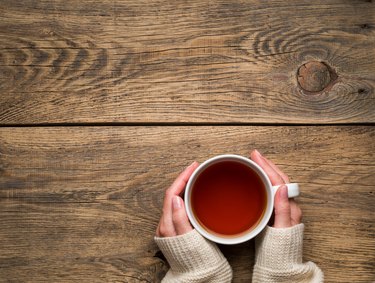
Don't expect any supplement — not even an herbal tea — to help you miraculously slim down. In some cases, opting to take these methods might even be dangerous for your health, such as in the case of 3 Ballerina Tea, which is made from senna, an herb commonly used as a laxative.
You can find 3 Ballerina Tea online, and you don't need a prescription to buy it. However, you should still consult your doctor before trying this product as part of your weight loss efforts and be prepared for some unpleasant side effects.
Video of the Day
Video of the Day
Senna as a Laxative
According to its label, 3 Ballerina Tea contains 3 grams of senna per serving. The National Institutes of Health explains that senna is an over-the-counter laxative that contains compounds called sennosides, which stimulate the colon, thus promoting the contraction and relaxation necessary to empty it.
Senna is commonly used in herbal teas for purging and weight loss, such as it is in 3 Ballerina Tea, but a typical dose is 15 to 30 milligrams twice a day rather than the 3 grams contained in each 3 Ballerina Tea bag.
While senna might be effective for constipation, there's not enough evidence to suggest it is effective for weight loss, according to the U.S. National Library of Medicine. Its side effects include diarrhea and loose stools, which can lead to dehydration, electrolyte imbalance and potassium deficiency. Long-term use of senna can even stop the bowels from working the way they're supposed to, leading to a dependence on laxatives for bowel movements.
Laxatives Aren’t for Weight Loss
Even if senna products like 3 Ballerina Tea are effective laxatives, both the National Institutes of Health and the U.S. National Library of Medicine note that there's really not enough evidence to support that they work for weight loss — besides as an unpleasant side effect of excessive diarrhea, which NIH does list.
More important, laxatives should not be used for losing weight. This has been a point of discussion as far back as the '80s, when a review published in March 1989 in the Journal of American College Health identified that college students, most notably those with eating disorders, were using laxatives this way.
The journal described it as a "dangerous habit" and pointed out that laxative abuse can lead to medical problems, including such side effects already described like electrolyte and fluid imbalance, as well as structural and functional colonic changes and allergic reactions.
More recently, in February 2015, the journal Clinical Medicine Insights: Endocrinology and Diabetes published an article that reported that 12 percent of adolescent women and 8 percent of men have tried extreme methods for weight loss — laxatives among those methods, plus diet pills, diuretics and purging. These unhealthy dietary practices can even lead to regaining lost weight and putting the user in a cycle of losing and gaining.
Choosing Smarter Dietary Options
Instead of using laxatives to control your weight, you're better off turning to fiber from whole foods. Fiber provides many of the same benefits of laxatives without the extreme risks. The American Academy of Family Physicians points out that fiber is helpful for combating constipation, and it can aid in weight loss by helping you feel full faster and stay full longer. It can even reduce your risk of chronic disease and lower cholesterol.
Fiber can be found in fruits, vegetables, whole grains and beans. Men ages 50 and younger should get 38 grams of fiber a day, and 30 grams of fiber after age 50; women age 50 and younger should get 25 grams of fiber a day, and 21 grams after age 50. Be sure to drink at least eight glasses of water so the fiber has enough fluid to absorb.
Fiber isn't without side effects of its own — if you add too much to your diet too quickly, you could feel bloated and gassy. Add a little bit to your diet over time so your body can acclimate. In time, you'll be on the road to better health and maybe even a lower weight.
- National Institutes of Health: “Senna”
- U.S. National Library of Medicine: “Senna”
- American Academy of Family Physicians: “Fiber: How to Increase the Amount in Your Diet”
- Journal of American College Health: “Laxative Abuse: A Hazardous Habit for Weight Control”
- Clinical Medicine Insights: Endocrinology and Diabetes: “Unhealthy Weight Control Practices: Culprits and Clinical Recommendations”
- Truong Giang Corp: "3 Ballerina Tea"